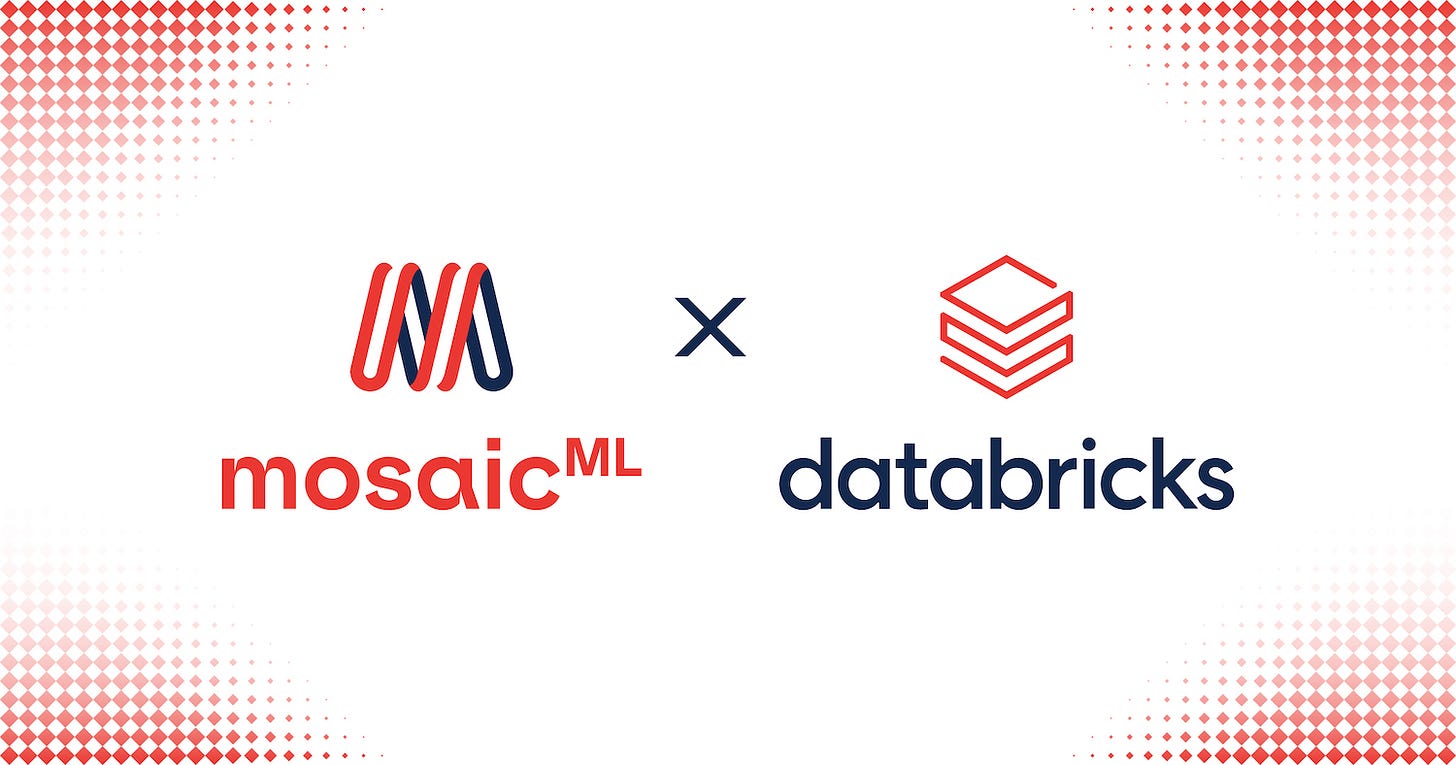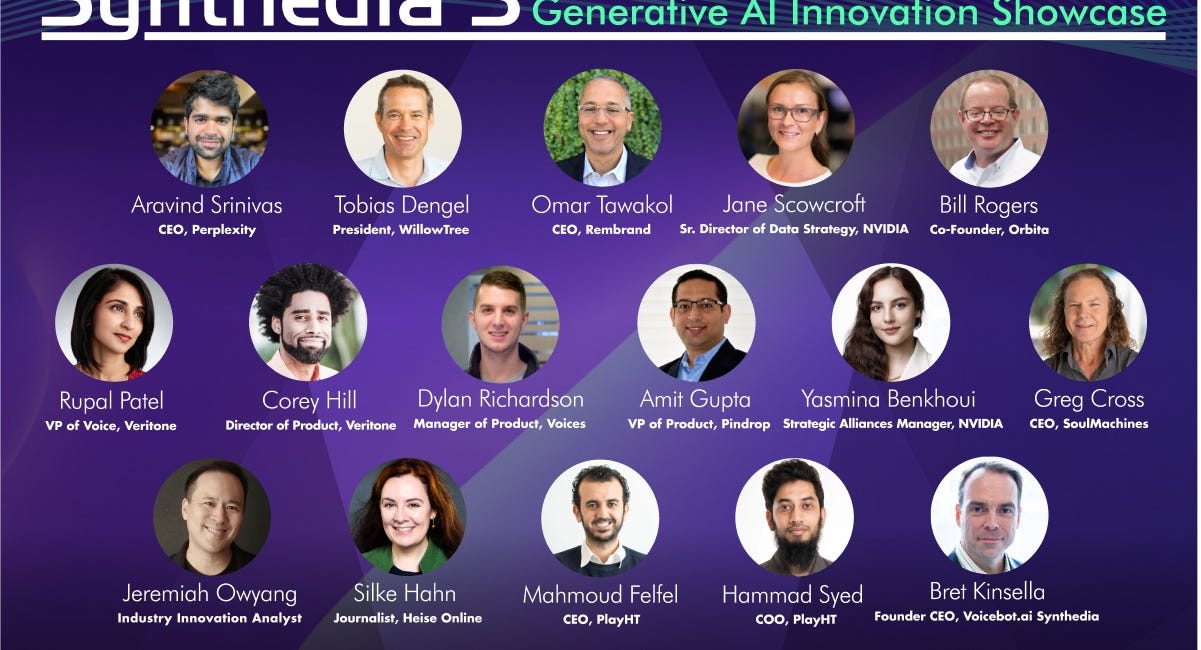Databrick's Acquires Generative AI Data Startup MosaicML for $1.3 Billion
We are excited to announce that MosaicML has agreed to join Databricks to further our vision of making custom AI model development available to any organization.
Naveen Rao, Hanlan Tang, MosaicML
Databricks, a data storage and management company, announced it will acquire generative AI foundation model developer MosaicML for $1.3 billion. The deal is expected to close by the end of July 2023. According to the announcement:
MosaicML is known for its state-of-the-art MPT large language models (LLMs). With over 3.3 million downloads of MPT-7B and the recent release of MPT-30B, MosaicML has showcased how organizations can quickly build and train their own state-of-the-art models using their data in a cost-effective way. Customers such as AI2 (Allen Institute for AI), Generally Intelligent, Hippocratic AI, Replit and Scatter Labs leverage MosaicML for a wide variety of generative AI use cases.
Storing and Creating Data
Databricks charges customers based on the data they store and process using its products. Generative AI model developers gather a lot of data for training, create training data, run multiple training cycles, add embeddings, conduct fine-tuning, and run inference jobs. These are all potentially lucrative sources of income for Databricks units (DBU) consumption.
The company already had a data science and ML product, but MosiacML adds foundation models that enterprises can use to create custom generative AI solutions. According to the Wall Street Journal:
MosaicML, which was launched in 2021 and will become a stand-alone service belonging to Databricks, has been focused on bringing down the cost of using generative AI—from tens of millions of dollars to hundreds of thousands of dollars per model, according to Naveen Rao, co-founder and CEO. MosaicML has 62 employees and has raised $64 million to date.
Know Your Model
A key value proposition for using custom foundation models is that enterprises know how they were trained, what data was used, and what really lies in the vector database. However, most companies are not in a position to create their own foundation model from scratch, which makes tools like MosaicML attractive. Also, from the Wall Street Journal:
“If you’re building a model from scratch, you know what you’re feeding it,” said Databricks Chief Executive Ali Ghodsi. Off-the-shelf models, which are ready to use because they have already been trained on internet data, are filled with extraneous information that can skew results, Ghodsi said. Many companies are also wary of privacy and security issues around sharing their data in models built by outside vendors, he said.
Custom Generative AI Models at Lower Cost
The rise of new training techniques such as LoRA (low-rank adaptation), open-source models, and other high-quality large language models (LLM) that are 5% to 25% the size of GPT-3 in terms of parameters is expected to expand customer model development rapidly. MosaicML pitches data ownership, privacy, and security benefits and also lower cost. Also in the Wall Street Journal.
Larry Pickett, chief information and digital officer of biopharmaceutical services company Syneos Health, said the current cost of training a model on specialized health data is estimated at $1 million to $2 million. Those kinds of “domain-specific” models can be more useful for companies than ChatGPT, because they have more industry terminology and know-how, analysts say.
But Pickett expects that Syneos Health can spend significantly less than that by using smaller, pre-trained models, “as opposed to building on top of the entire corpus of data that OpenAI has.” Some of those models are already available in open-source libraries like those offered by machine-learning startup Hugging Face, he said.
High Valuations
A $1.3 billion price tag for a company that is two years old and has raised just $64 million offers a sense of how valuable the generative AI market is expected to be for the winners. Databricks generated $1 billion in revenue in 2022. It has now spent more than that on acquiring a much smaller company. In return, it just significantly expanded its total addressable market (i.e., market size) and created leverage to earn more revenue from MosaicML’s existing customers for data management.
Don't Miss the Generative AI Innovation Showcase - Synthedia 3 Online Conference
Synthedia 3 is an online conference showcasing generative AI demos, new features, and insights from innovators shaping today's most significant technology segment. The conference is free, but you must register to attend or to get early access to the video recordings post-event. And it is next week!
This One Factor Could Kill Bing Chat. Google SGE and Perplexity AI are in a Different League.
Google dominated its early search rivals by delivering higher-quality search results more frequently. However, it was also maniacally focused on speed. That spartan Google search splash page was a sharp contrast to the cluttered portal concept of Yahoo, AltaVista, and the other search giants of the day (and even some of what you see from Bing today).





